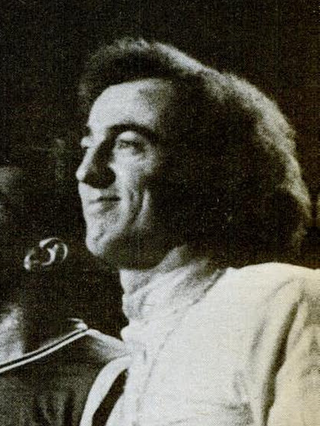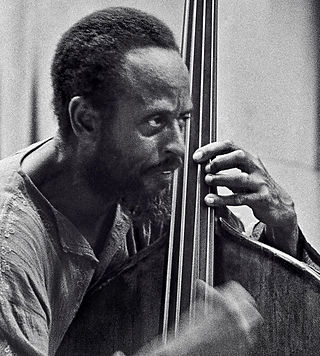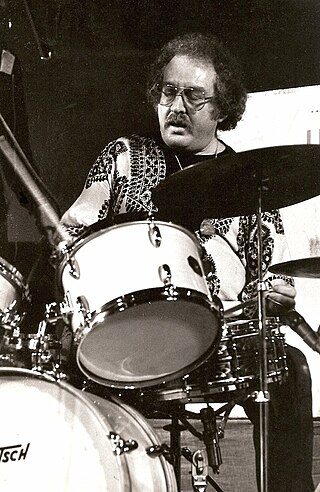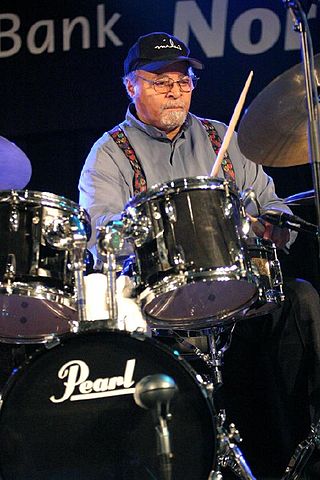Related Research Articles

Richard Quentin Laird was an Irish musician, best known as the bassist and a founding member of the jazz fusion band Mahavishnu Orchestra, with which he performed from 1971 to 1973.
Jerome Richardson was an American jazz musician and woodwind player. He is cited as playing one of the earliest jazz flute recordings with his work on the 1949 Quincy Jones arranged song "Kingfish".

Percy Heath was an American jazz bassist, brother of saxophonist Jimmy Heath and drummer Albert Heath, with whom he formed the Heath Brothers in 1975. Heath played with the Modern Jazz Quartet throughout their long history and also worked with Miles Davis, Dizzy Gillespie, Charlie Parker, Wes Montgomery, Thelonious Monk and Lee Konitz.

Sonny Stitt was an American jazz saxophonist of the bebop/hard bop idiom. Known for his warm tone, he was one of the best-documented saxophonists of his generation, recording more than 100 albums. He was nicknamed the "Lone Wolf" by jazz critic Dan Morgenstern because of his tendency to rarely work with the same musicians for long despite his relentless touring and devotion to the craft. Stitt was sometimes viewed as a Charlie Parker mimic, especially earlier in his career, but gradually came to develop his own sound and style, particularly when performing on tenor saxophone and even occasionally baritone saxophone.

Melvin Sokoloff, known professionally as Mel Lewis, was an American jazz drummer, session musician, professor, and author. He received fourteen Grammy Award nominations.

Ronnie Scott OBE was a British jazz tenor saxophonist and jazz club owner. He co-founded Ronnie Scott's Jazz Club in London's Soho district, one of the world's most popular jazz clubs, in 1959.

Wilbur James "Jimmy" Cobb was an American jazz drummer. He was part of Miles Davis's First Great Sextet. At the time of his death, he had been the Sextet's last surviving member for nearly thirty years. He was awarded an NEA Jazz Masters Fellowship in 2009.

Ronnie Scott's Jazz Club is a jazz club that has operated in Soho, London, since 1959.

Ernest Harold "Benny" Bailey was an American jazz trumpeter.
Edward Ernest Sauter was an American composer and arranger during the swing era.

George Duvivier was an American jazz double-bassist.

Charles Lawrence Persip, known as Charli Persip and formerly as Charlie Persip, was an American jazz drummer.

Peter Alexandru Herbolzheimer was a Romanian-German jazz trombonist and bandleader.
Alan Branscombe was an English jazz pianist, vibraphonist, and alto saxophonist.
Keith Ronald Christie was an English jazz trombonist. He was the brother of Ian Christie.
Peter Stephen George King was a British jazz tenor saxophonist. He co-founded London's Ronnie Scott's jazz club and was its manager for almost fifty years.
Jackie Dougan was a British jazz drummer.
Simon Richard Spillett is a British jazz tenor saxophonist. He has won the BBC Jazz Awards Rising Star (2007), Jazz Journal's Critics' Choice album of the Year (2009), the British Jazz Awards Top Tenor Saxophonist (2011), and Services to British Jazz award (2016).
Gregory Bowen is a Welsh trumpet player. His primary work was done in London before relocating to Berlin, Germany in 1976. Since 1961, Bowen has performed and recorded with jazz, pop artists and entertainers from Europe and North America on records, soundtracks and T.V. broadcasts. Most notable is his lead trumpet work on the James Bond film soundtracks Goldfinger, Thunderball and You Only Live Twice.
References
- ↑ Ronnie Stephenson Discography www.allmusic.com
- ↑ Ronnie Stephenson Obituary www.heraldscotland.co.uk
- ↑ Ronnie Stephenson Biography www.jazzprofessional.com
- ↑ Ronnie Stevenson write up (top right of page) www.henrybebop.co.uk